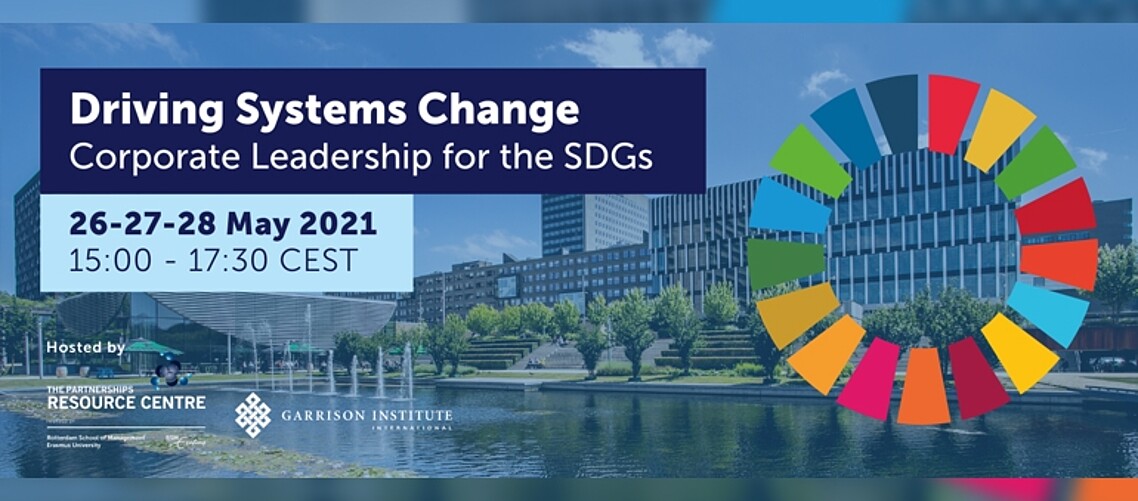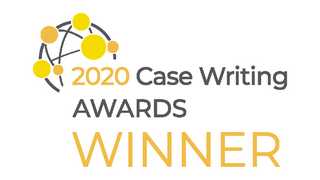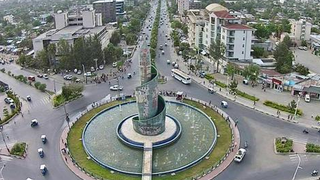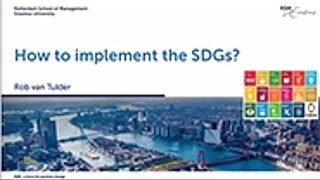World-class thinkers and business leaders
Speakers include Prof. Jeffrey Sachs of Columbia University; Peter Bakker, President & CEO of the World Business Council for Sustainable Development; Prof. Mette Morsing Head of PRME in the UN Global Compact; Paul Polman, Co-Founder of IMAGINE; Kailash Satyarthi, Nobel Peace Laureate 2014; and Rob van Tulder of RSM and Academic Director of the Partnerships Resource Centre.
The online conference is arranged over three afternoon sessions from 15:00 to 17.30 CEST on Wednesday 26, Thursday 27 and Friday 28 May. Each day takes a different theme: business models, principles and practices, and leadership for stepping up to the challenge of driving systems change, and includes presentations from experts, consultants and leading thinkers in international business, as well as panel discussions and breakout sessions.
Explore the framework
Prof. Rob van Tulder, Academic Director of the Partnerships Resource Centre explains: “Right now, the UN’s 17 SDGs are the best agenda available to share ambitions and measure progress towards the achievement of a large number of common goals. But progress goes too slow. We will launch several frameworks that can help businesses to deal with them.”
Specific examples for sustainable core business
The conference will launch a long-awaited textbook on the SDGs called Principles of Sustainable Business. Frameworks for corporate action on the SDGs. The book is the result of 15 years of research with companies in developing transformational business models – either alone or with NGOs and governments. Three questions are addressed: why do the SDGs represent the best available agenda for companies; who should be involved in what, and how can companies effectively implement actionable approaches that can seriously step up the pace in achieving the 2030 SDG agenda? An additional framework that will be launched during the conference zooms in on the ‘nexus challenge’. It has been put together by PhD researcher Jan Anton van Zanten – an SDG strategist at Robeco – and Prof. Van Tulder. It is the result of research conducted since 2015 on the way companies can use the full potential of interlinkages between the SDGs. The paper that will be launched presents a framework that companies can adopt to better understand their existing impacts on sustainable development. Other frameworks to be launched during the conference include teaching modules, case studies, leadership frames and SDG accelerator frameworks.
Three themes
Wednesday 26 May – The Strategic Challenge
How to translate the SDGs in concrete business models aimed at inclusive and sustainable growth. Starting with the role of corporations in the Decade of Action and focussing on the role of partnerships, the connections between SDGs and principles of sustainable business. Speakers include: Prof. Jeffrey Sachs (Chief advisor to the UN on the SDGs) and Peter Bakker (President & CEO of the World Business Council for Sustainable Development).
Thursday 27 May – The Operational Challenge
How to translate the ‘nobody left behind’ principle of the SDGs in concrete practices that can be implemented and measured. This session is all about implementing business models to realise the ambitions. This includes talks on making transitions as a company, how to measure progress and the role of business schools in training and teaching new leaders. Speakers include: Robert Metzke (chief strategist of Philips), Mette Morsing (Head of PRME of UN Global Compact) and Asko Aho (former Prime Minister of Finland and Vice-president of Nokia).
Friday 28 May – The Leadership Challenge
How can business contribute to peace building and planetary resilience? Leaders have the power and responsibility to lead the transition, but what leadership qualities are required for this? A conversation between leaders in civil society and business on tackling big societal challenges and the role of future leaders. Speakers include: Kailash Sathyarthi (Nobel Peace Prize Laureate 2014) and Paul Polman (Chair of Imagine & former CEO of Unilever)
The full schedule for each of the three days can be found on the conference registration webpage here.



